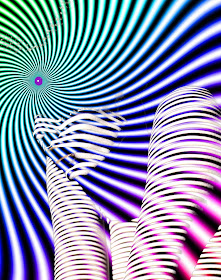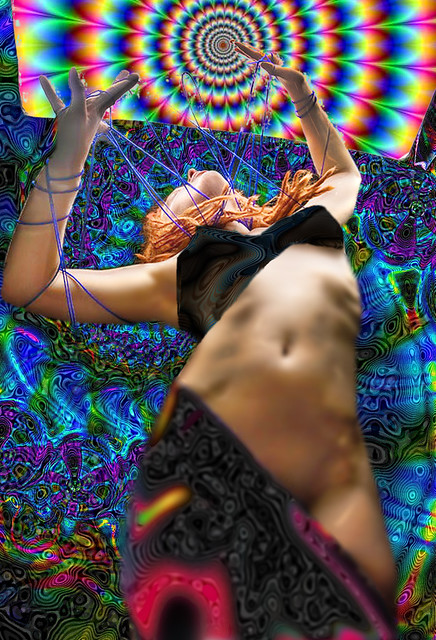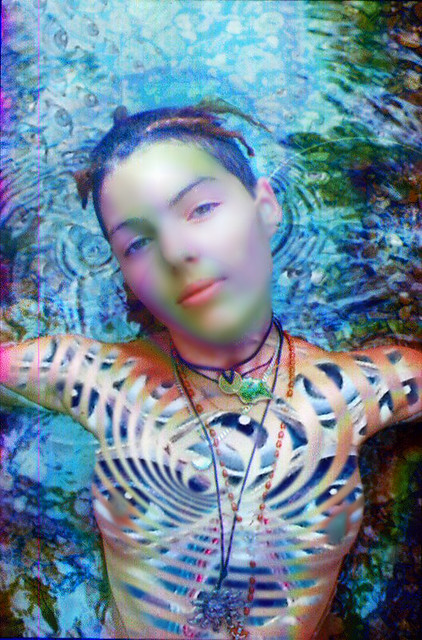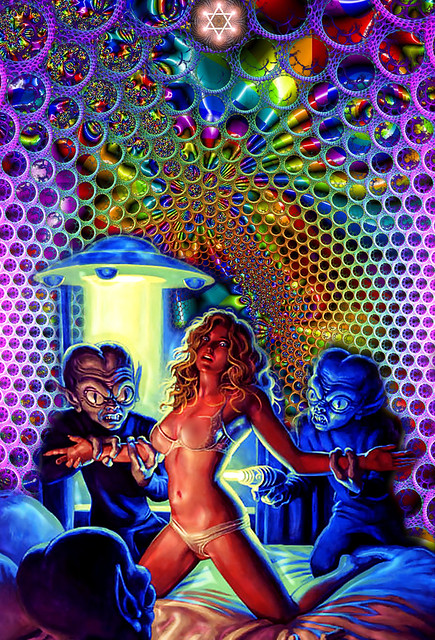Running the Gauntlet:
Alien Intervention
Psychedelic Water 25
*

The shaman shifts into first gear when the door slams shut and the Jackaroo Deva flattens twin muddy trails in the unkempt paddock. They slowly circle a fungal encampment of varicoloured domed tents and turn onto the rutted wheel tracks that score the recently shorn grassy weeds. Maryanne leans forward between the front seats and her coffee-flavoured breath pours across Ram’s face. “You don’t really believe that little green men are coming to Earth and kidnapping people, do you?”
“Not little green men; and not aliens, but travellers who are aspects of our selves. And most of them don’t kidnap anyone.” He nods when they pass their host. Paul distractedly smiles back as he kneels beside a small mobile chicken coop to distribute handfuls of grain to jittery hens. The chooks flap about in their wire pen, disconcerted by the atonal symphony of noisesome humankind who’ve so rudely and recently filled their peaceable domain with raucous simian yammering.
“What would they want with human beings, anyway?” Maryanne perseveres. “Do they put us in zoos or cut us up for medical experiments or spare parts, or what?”
The shaman glances into the mirror and catches her frown-crowned eyes. “The entire planet is a zoo to some of them. It’s hard to remember that infinity is a very big place; many more than one type of being interacts with us all the time, and have done for ever.”
“So, what, then? We’re just animals to them?”
“Or some kind of breeding experiment?” the Professor suggests with a sarcastic smile. The shaman glances into his eyes in the rear vision mirror while Maryanne waves farewell to Paul and the chooks. “Or both, maybe?” she asks.
“ ‘Just’ animals?” the shaman asks in reply. “It’s hardly surprising we worry about becoming medical experiments in the hands of others. The way we treat animals is the reason for all our fears about what may happen if we find ourselves helpless in the hands of another species.”
“Lab animals have a piss-poor life, I guess,” the Professor observes.
“The hens seem happy,” Maryanne says as she snuggles toward him. The professor’s arm winds round her shoulder and the shaman raises his voice to be heard over the engine’s rumble; “Almost every creature that falls into human hands ends up having a terrible life – and then they’re cooked and eaten.” The four wheel drive enters an exit tunnel formed by an arcade of overarching acacias and they all return a happy wave from a wet clot of barefoot young ferals who are obviously on their way back from the swimming hole.
Ram’s voice judders as they accelerate across a patch of outsized rocks embedded in a muddy patch of driveway. “Could human fears of ‘alien abduction’ have anything to do with guilt and karma? What do you suppose those chickens think about all this?”
“But that’s just it – animals don’t think!” the Professor yells as the vehicle revs uphill on the sparsely gravelled dirt track. The shaman yells back over the roar; “All that old garbage spewed by Descartes has been proven wrong. Modern brain and behavioural studies have shown that animals think and dream and plan. And not just higher-order animals, either.” He weaves around a bikini-clad bevy of pedestrians and drives through a long broad arch of native bush toward the recently tarred road. “But the truth of the matter goes much deeper. Everything’s conscious and aware – everything has a personality, emotions and aspirations. And we always like to believe we’re better than all other lifeforms; it’s written into most religions.”
“Too right,” agrees Maryanne. “I’d like to go vegetarian.”
“Why don’t you, then?” goads her boyfriend.
“Because I live with you!” she declares, bouncing back into his arms. “So you reckon they treat us the way we treat animals?” she calls over the din as the Jackaroo Deva’s wheels spin in a clay filled ditch on the edge of the bitumen.
“All those stories you’ve heard about ‘aliens’ harvesting body parts and conducting medical experiments on humans is no different to the things we do every day,” the driver avers.
“So you reckon it’s just projection – we imagine that’s what we’d do in their place?” the Professor asks. “Partly,” his chauffer replies as they wend their way uphill between a plunging lantana-strewn slope and the vast shadowy grove of an overgrown macadamia orchard. “But very few other races actually abduct humans. And it really has everything to do with our karma – and dharma – as well. We magnetise events to ourselves…” He almost plunges off the narrow one lane road when a battered old Fnord panel van plummets downhill around a blind corner. Its bearded driver grins maniacally, laughing at his dreadlocked offsider as he offhandedly pilots the careening van toward the Star Earth Tribe’s camp. “…But the multiverse is a very big place where everything tends to happen.”
“Shithead!” Maryanne grips the headrest of the driver’s bucket seat. “So that’s why you reckon they come here, stealing babies from mothers’ wombs? If these ‘space travellers’ are so much more advanced that us, what would they need with anything we have?”
“It’s more to do with what we are – and the biosphere is a Mother’s womb! But for a start, most aren’t space travellers in the strictest sense, but space-time travellers…”
“Like Doctor Who, eh?” she laughs.
“ ‘Exterminate’…” her boyfriend cries in a warbling tremolo as his hand slaps his mouth in a cartoon Amerindian war whoop.
The shaman waits until the younger man has expended his breath. “Some come from various versions of our own futures, returning to the source of the grime.” He shifts up to third, admiring the lichen-coated boles of rare native trees on the side of the track as they trundle uphill. “Why?” Maryanne asks. “To make home movies, or what? We know so little about them or ourselves, I guess… but it’s hard to see why they’d want to have anything to do with us. And say you’re right – what if they killed their own grandparents?”
“The old grandfather paradox is a furphy,” he yells to her reflection, keeping the revs high on the steep slope. “We live in a multiverse, not a universe, so when time travellers come here they enter a parallel universe very like their own, instead of the one they come from – so there’s no paradox if they kill someone who seems to be their own grandparent, for instance; nothing changes back in their home realm.
He pauses while they digest this convoluted morsel. “And some live in space all or much of the time. Our level of awareness is brutish compared to many who spend a lot of time outside gravity wells.”
“Brutish…” Maryanne savours the word. “We’re savages, sure… but we know so little – about our bodies, even – that it’s hard to see what they might need us for. You think they need our wombs – or our babies?”
He watches her features fray with concern in the widescreen mirror as she persists along her wonted track. “It’s not that unborn babies are usually kidnapped,” he tells her. “Most are implanted in the first place before they’re removed…”
“Implanted? Don’t alien… uh, ‘travellers’ have wombs of their own?”
“With a view?” the Professor laughs as they motor uphill past the upper ranks of untended macadamia trees.
“Actually, many don’t have wombs at all. They breed artificially. Some represent versions of ourselves who pursued a technological route of reproduction for millennia, and now their fertility is failing…”
“Did away with women at last, huh?” the Professor suggests.
“Men, more likely,” sneers his girlfriend.
“Both, actually.”
“So what, they need our fertile genes to backbreed with or something?” the Professor chortles.
“A little of that. Some also abandoned emotions along the way, and eventually realised they need those as well.”
“Fascinating bullshit,” Maryanne’s boyfriend announces, buckling his seatbelt when the main road comes into sight. “Why would they need to come here to do that? Seems pretty inefficient.”
“Well… you know how the cells that will become testicles or ova start out as the same cells, before the chromosomes of the foetus tell them which form to take – whether to become female or male?”
“Are you changing the subject?”
“No – I just wonder if you know where those germ cells come from in the first place.”
“From the mother and father, of course; they’re there in the genes to start with.”
“No they aren’t – not directly. That’s an interesting detail very few people are ever taught about human reproduction. The germ cells which ultimately become testes or ova don’t come from the foetus at all.”
“Where do they come from, then? Space travellers invading our wombs?” the Professor suggests as he snuggles up to his girlfriend.
“Not quite…”
“Bullshit!” he yells from the back while Maryanne sinks into his larger frame. “The ‘y’ chromosome determines sex, that’s all. The cells are there from the beginning.”
“It’s an unsurprisingly little-known fact that they simply aren’t. The germ cells come from the egg sack – from the mother’s placenta.”
“What? No way, man!”
“Yes way, dude,” he retorts (assuming the Professor doesn’t realise that the word ‘dude’ also means ‘camel’s penis’). He stops at the t-intersection while a stream of traffic pours down the larger narrow road before them. “The cells detach from the placenta and enter the womb. Only once the germ cells lodge in the foetus do they begin to differentiate according to the presence or absence of the ‘y’ chromosome. The reproductive cells originate inside the mother.”
“But that would mean that all the genetic potential in daughters or sons comes exclusively from the mother!”
“Not exactly – the foetus is a melding of father and mother, but the organs that make the reproductive cells aren’t; they’re cells from the womb which are reprogrammed to fit the foetus’ development.”
“But all the reproductive cells actually come from the mother?” The Professor stares at the passing traffic as he contemplates this apparent absurdity.
“Before they’re reprogrammed by the new genetic mix, aye – and her mother, and hers, and hers down through time – just like mitochondrial DNA.”
“If that’s true, it’s pretty amazing.”
“It’s true all right. Do a little research and…”
“But I don’t believe it.”
“Fine,” the shaman replies, turning to face his passengers while they wait at the juncture of the road to town. “But to get back to the original issue – if you’ll pardon the pun – any child brought up exclusively in a test tube wouldn’t have any functioning sexual organs at all; not unless they spent time during a critical juncture of development inside a mother’s womb.”
“They’d have no sex at all? Just neuters?” asks Maryanne while she fumbles with her knotted seatbelt.
“More like workers in an insect hive; they’d all appear female, more or less – but with no functional sex organs.”
“That’s horrible,” she says with a grimace.
“Maybe from the perspective of humans at the dawn of the twenty-first century. Travellers can come from infinitude futures, but many have cut themselves off from natural reproduction and everything that comes along with it, to their detriment. That’s why they need us. They realise they’ve lost something essential and they’ve reached an evolutionary dead end, regardless of the level of their genetic technology.”
“I’m glad we’re more than just a gene pool or organ bank, then.” Maryanne says. He hesitates to tell her that human blood is very useful, or that certain travellers prize human body parts for less benign reasons than those he’s currently outlining. “So, what, they stick their babies in a mother’s womb and then take them out and bring them to full term in a tank or something?”
“Or into one of their own females, one they’ve been back-bred for the purpose; that’s essential for emotional imprinting for mother and child. Sometimes they insert artificial wombs into human females who may or may not be carrying a naturally conceived child of their own at the same time. They sometimes insert hybridised human/traveller embryos into the wombs of human females for a time for a number of reasons – including adapting to this planet and acquiring emotions.”
The Professor laughs. “Poor bastards. They don’t know what they’re in for!”
*
A True Story
- R. Ayana
Images – author’s
*
From the Prince of Centraxis – BE AWARE! This link leads to implicate & explicit concepts & images! - Continues…
*
To see the Prince of Centraxis & Her(m)etic Hermit as intended you will require the Papyrus font – get it free @ http://www.boldfonts.com/fonts/P/Papyrus.html
*
Creative Commons Copy RIGHT
*
This material is published under Creative Commons Copyright – reproduction for non-profit use is permitted & encouraged, if you give attribution to the work & author – and please include a (preferably active) link to the original along with this notice. If you like what you see, please send a tiny donation or leave a comment! Thanks for reading this far…
The Her(m)etic Hermit – http://hermetic.blog.com



No comments:
Post a Comment
Add your perspective to the conscious collective